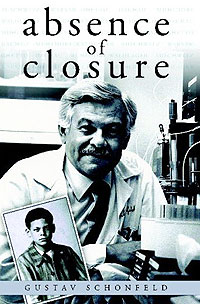Gustav Schonfeld, M.D., the Samuel E. Schechter Professor of Medicine, spent more than a year of his childhood in four Nazi concentration camps. When he was 10 years old, his family was taken from its home in Munkacs, Hungary, which is now Mukachevo, Ukraine, by cattle car to Auschwitz and separated.

He and his father, a physician, were sent to work in three more camps, where Schonfeld did various jobs, such as peeling potatoes, digging holes and helping in the medical dispensary in support of building a secret German airplane factory. Schonfeld was liberated by Gen. George S. Patton’s U.S. Army in May 1945 when he was 11.
Schonfeld recalls the details of that day vividly.
“For several weeks before the liberation, we heard and saw a lot of airplanes flying over camp,” he said in an interview. “Rumor was that these were American bombers who were going to bomb factories and railyards, and we heard distant explosions. A couple of days before the liberation, guards started disappearing, but there were still enough of them around that we didn’t break out of camp because we were afraid we’d get shot.
“On May 2, close to noon, we saw two American soldiers with Tommy Guns, scanning from side to side, marching on the road leading to the entrance to camp. Behind them were a couple of tanks. My cousin, who spoke English, asked them if they were Americans, and they said yes. Everybody opened the gates, and American tanks came in and stationed themselves at the entrance of the camp.”
Schonfeld’s memoir, “Absence of Closure,” describes his experiences in descriptive detail. In it, Schonfeld credits his father for saving his life by putting him to work in the dispensary, where his father treated sick prisoners, and giving his food to his son.
After the war, Schonfeld and his father spent a year recovering in Czechoslovakia, while relatives in St. Louis got the necessary immigration documents together to bring them to St. Louis. During this time, they were reunited with his mother, who had survived Auschwitz. The three Schonfelds moved to St. Louis about a year after the liberation.
Schonfeld went on to earn undergraduate and medical degrees from Washington University and to serve as chairman of the Department of Medicine from 1996-99. He is renowned for his research involving lipoproteins and their role in atherosclerosis and coronary artery disease. He is credited for discovering that the concentrations, compositions, structures and metabolism of lipoproteins are affected by changes in diet, hormone status and genetic factors. His work led to the design of low-cholesterol diets widely used today.
Until now, Schonfeld has not talked much about the atrocities he experienced as a young boy. He said he decided to write his memoir for his three children and seven grandchildren.
“It’s important for people to know,” he said. “In another 10-15 years, very few survivors will be alive, and the story will be left to the historians to tell. I wanted to add my bit of witnessing because it is important that the truth be told and that those who deny the Holocaust not have the last word.”
He plans to donate the proceeds from the book to the School of Medicine, the St. Louis Holocaust Museum and Learning Center, and two of the Hebrew day schools his grandchildren attend.